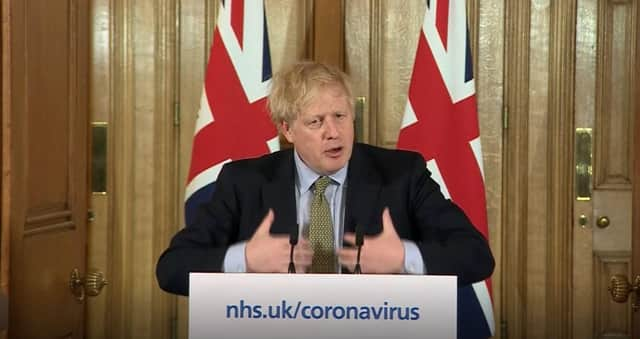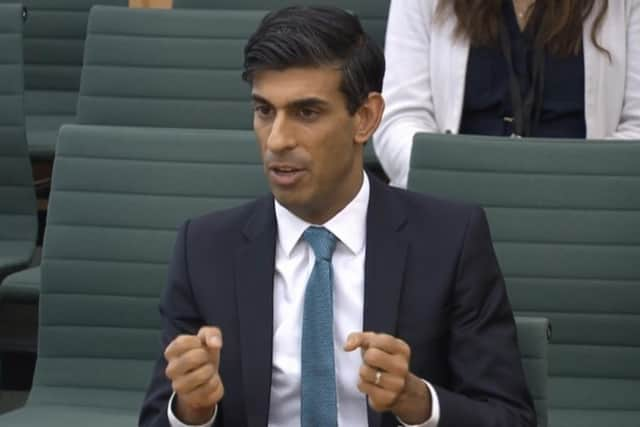Coronavirus: Boris Johnson, Nicola Sturgeon and Jackson Carlaw all setting the right tone – John McLellan


As Boris Johnson’s march to the Conservative Party leadership gathered momentum, even some supporters pointed to the lack of a viable alternative, quickly followed by a dismantling of what the other candidates offered.
Rory Stewart? Too weird? Sajid Javid? Too wooden. Jeremy Hunt? Boring Remainer. But despite the affairs and questions of integrity, Boris was box office; a proven winner and a man who could get Brexit done.
Advertisement
Hide AdAdvertisement
Hide AdAs the 80-seat majority in the General Election proved, a clear majority of the UK electorate agreed he was the man for the moment; he had broken the impasse in Parliament to force the election, he won it hands down and delivered Brexit as promised. The choice was vindicated.


But the response to the flooding, the Cabinet reshuffle, senior civil service unhappiness and allegations of bullying against Priti Patel, and the influence of chief adviser Dominic Cummings gave his many enemies the opportunity to sow discontent.
If only Labour would get its act together, they say, it would all be different. It’s not dissimilar to the early days of the Blair administration in 1997 when despite regular controversies – like the cosy deal to exempt Formula One racing from the tobacco advertising ban after Bernie Ecclestone gave the party £1m – the Tory opposition was still in such disarray that it made no difference.
For a Prime Minister who has studied Winston Churchill closely, in Covid-19 he now has his own version of the Darkest Hour but if doubts about Downing Street’s leadership have persisted, they have been blown away by Tuesday’s performance by new chancellor Rishi Sunak.
Advertisement
Hide AdAdvertisement
Hide AdDismissed only weeks ago as an emergency stand-in after Sajid Javid’s resignation, he produced exactly what the country needed at this time of crisis with an unprecedented £350bn of economic aid. But it wasn’t just the vast array of grants, loans and tax holidays that impressed, but the assured delivery, control and the mastery of the brief which revealed him as a potential future Prime Minister. And he’s still only 39.
He skilfully avoided boxing himself into a corner with the clear statement that more would need to be done, possibly within days, but opened the door for trade union involvement and ushered in an era of political co-operation not seen since the Second World War. He also signalled new powers would allow him to make more support available as necessary, so the shrill cries of U-turns have been dealt with because the groundwork is already done.Not everything is under his control – leaden bureaucracy must be cut through to ensure the vast amounts of public money now available get to the people who need it quickly and unquestioningly – but the tone is set. The message from both the Prime Minister and the Chancellor that the Government will do “whatever it takes” needs to be understood by every single public servant in the land.Carping opponents might be desperate to believe that pumping more money than the entire GDP of a medium-sized European nation into the economy is just tinkering, but First Minister Nicola Sturgeon sent the right message by declaring: “I have never been less interested in party politics than I am right now.” So too was Scottish Conservative leader Jackson Carlaw’s response that he had “every confidence in her to lead the country’s response to this crisis,” an illustration of just how much times have changed.We can see the impact all around us. The buses are empty and will surely go to weekend timetables within days, the main roads at rush hour are like Sunday evenings, supermarket shelves are empty and the city centre, usually beginning to thrum with tourists as Easter approaches, is deserted. Pubs and restaurants have no trade and what is left of normal economic activity is going on quietly in hastily assembled home offices and only essential services are running. And it’s the same in every city, town and village in the developed world.Necessity being the mother of invention, things will never completely go back to what they were because new ways of doing things will have been found, new attitudes to work-life balance will emerge and it may ultimately be for the better. But right now, all that matters is what gets us through.
My own ‘underlying health issues’
Callous perhaps, but misplaced relief is a natural reaction when newsreaders say the latest virus victim had “underlying health issues”.
But what does the phrase actually mean? Advanced heart disease, chronic obstructive lung disorder, cancer, obviously, but apparently the Scottish Government definition is anyone eligible for the flu vaccine, so all over-65s. Which isn’t so reassuring.As I’ve had mild asthma I’ve had the jab and having had a heart operation five years ago I’m clearly in the category. So when I hear a bloke in his 50s has died with “underlying health issues” it’s no longer met with a philosophical “oh well”, but a gulp.